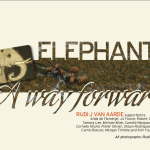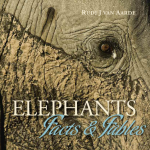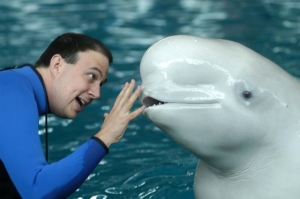 Ken Ramirez www.kenramireztraining.com In October 2014, Ken Ramirez officially begin his new role as Executive Vice-President and Chief Training Officer of Karen Pryor Clicker Training where he helps oversee the vision, development and implementation of training education programs for the organization. This move is in line with Ken's philosophy of helping to bring positive reinforcement training to all corners of the animal training world.
Ken previously served as the Executive Vice-President of animal care and animal training at Chicago's Shedd Aquarium, where he developed and supervised animal care and animal health programs, staff training and development as well as public presentation programs for the entire animal collection of more than 32,000 animals. He worked at Shedd for nearly 26 years. In October 2014 Ken began a new role as a training advisor at Shedd as part of his responsibilities with Karen Pryor's organization.
A 35+ year veteran of animal care and training, Ramirez is a biologist and animal behaviorist who served nine years at Marineworld of Texas. He also was a trainer and coordinator at Ocean Safari in South Padre Island, Texas, as well as acting as a consultant to many zoo and aquarium programs throughout the world. He began his training career working with guide dogs for the visually impaired and has maintained a close affiliation to pet training throughout his career. He hosted two successful seasons of the pet training television series “Talk to the Animals” that compared pet training to the important work done with training and caring for animals in zoological facilities. He has also recently worked closely with several search and rescue dog organizations, service dog groups, as well as with bomb and narcotic dogs.
Since 2005, Ken has brought his experience as a trainer of many cognitive projects with marine mammals and primates to the dog arena. Most notable has been his work with modifier cues, adduction, matching to sample, mimicry, and counting. The latter two projects: teaching dogs to mimic or imitate other dogs; and to learn the concept of counting are in the process of being prepared for scientific publication. Both of these projects norvasc have documented cognitive abilities in dogs that have not been previously well documented or understood.
Ramirez has been active in several professional organizations, including the International Marine Animal Trainer’s Association (IMATA), of which he is a past president. Ken has been actively involved in the creation of a certification process for animal trainers in zoological settings. He has been on the faculty of Karen Pryor’s Clicker Expos since 2005.
Ken Ramirez www.kenramireztraining.com In October 2014, Ken Ramirez officially begin his new role as Executive Vice-President and Chief Training Officer of Karen Pryor Clicker Training where he helps oversee the vision, development and implementation of training education programs for the organization. This move is in line with Ken's philosophy of helping to bring positive reinforcement training to all corners of the animal training world.
Ken previously served as the Executive Vice-President of animal care and animal training at Chicago's Shedd Aquarium, where he developed and supervised animal care and animal health programs, staff training and development as well as public presentation programs for the entire animal collection of more than 32,000 animals. He worked at Shedd for nearly 26 years. In October 2014 Ken began a new role as a training advisor at Shedd as part of his responsibilities with Karen Pryor's organization.
A 35+ year veteran of animal care and training, Ramirez is a biologist and animal behaviorist who served nine years at Marineworld of Texas. He also was a trainer and coordinator at Ocean Safari in South Padre Island, Texas, as well as acting as a consultant to many zoo and aquarium programs throughout the world. He began his training career working with guide dogs for the visually impaired and has maintained a close affiliation to pet training throughout his career. He hosted two successful seasons of the pet training television series “Talk to the Animals” that compared pet training to the important work done with training and caring for animals in zoological facilities. He has also recently worked closely with several search and rescue dog organizations, service dog groups, as well as with bomb and narcotic dogs.
Since 2005, Ken has brought his experience as a trainer of many cognitive projects with marine mammals and primates to the dog arena. Most notable has been his work with modifier cues, adduction, matching to sample, mimicry, and counting. The latter two projects: teaching dogs to mimic or imitate other dogs; and to learn the concept of counting are in the process of being prepared for scientific publication. Both of these projects norvasc have documented cognitive abilities in dogs that have not been previously well documented or understood.
Ramirez has been active in several professional organizations, including the International Marine Animal Trainer’s Association (IMATA), of which he is a past president. Ken has been actively involved in the creation of a certification process for animal trainers in zoological settings. He has been on the faculty of Karen Pryor’s Clicker Expos since 2005.
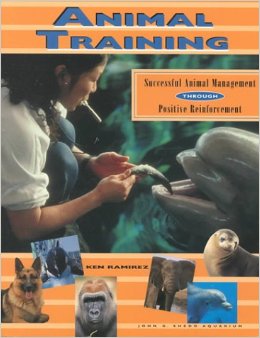 Ramirez has written for numerous scientific publications and authored countless popular articles. He authored the book “ANIMAL TRAINING: Successful Animal Management through Positive Reinforcement”, published in 1999. He also teaches a graduate course on animal training at Western Illinois University.
Ramirez has written for numerous scientific publications and authored countless popular articles. He authored the book “ANIMAL TRAINING: Successful Animal Management through Positive Reinforcement”, published in 1999. He also teaches a graduate course on animal training at Western Illinois University.
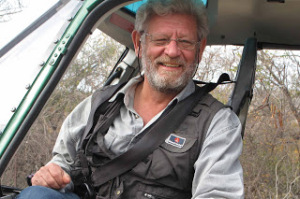 Rudi van Aarde www.ceru.up.ac.za/index.php
Chair of Conservation Ecology and Director of CERU
Rudi directs the Conservation Ecology Research Unit (CERU) as a self-sufficient research entity funded via grants from national and international organisations and private industries. These grants also support research fellows, support staff, and post-graduate bursaries. His research focuses predominantly on two lines of inquiry.
Rudi's research on elephants focuses on the drivers of demographic variability and heterogeneity in spatial utilization, with emphasis on finding solutions for the causes rather than symptoms of so called 'elephant problems'. This research is conducted across gradients of environmental and management conditions in southern African protected areas in Mozambique, Malawi, Zambia, Botswana, Namibia, and South Africa. CERU's development of the 'megaparks for metapopulations' concept is an innovative platform for elephant management that emphasizes spatial structuring of populations and demographic responses to heterogeneity in environmental resources. This management option has important implications for the continuing and controversial debate on elephant management.
Rudi's research on the restoration of coastal dune forest in northern KwaZulu-Natal (South Africa) started 21 years ago. Coastal dune forest is rare in South Africa and falls within the Maputaland-Pondoland-Albany biodiversity hot spot. Some 10% of this forest is protected, but 43% has been transformed. The remaining 57% is threatened by tourism, dune mining, and clearing for subsistence living. The narrow and linear nature of the forest further contributes to its sensitivity to transformation, isolation, and fragmentation, and its restoration makes both conservation and economic sense. The project is now well established and CERU's scientific achievements here provide a recognized scientific foundation for restoration ecology in southern Africa. Professor van Aarde
Rudi van Aarde www.ceru.up.ac.za/index.php
Chair of Conservation Ecology and Director of CERU
Rudi directs the Conservation Ecology Research Unit (CERU) as a self-sufficient research entity funded via grants from national and international organisations and private industries. These grants also support research fellows, support staff, and post-graduate bursaries. His research focuses predominantly on two lines of inquiry.
Rudi's research on elephants focuses on the drivers of demographic variability and heterogeneity in spatial utilization, with emphasis on finding solutions for the causes rather than symptoms of so called 'elephant problems'. This research is conducted across gradients of environmental and management conditions in southern African protected areas in Mozambique, Malawi, Zambia, Botswana, Namibia, and South Africa. CERU's development of the 'megaparks for metapopulations' concept is an innovative platform for elephant management that emphasizes spatial structuring of populations and demographic responses to heterogeneity in environmental resources. This management option has important implications for the continuing and controversial debate on elephant management.
Rudi's research on the restoration of coastal dune forest in northern KwaZulu-Natal (South Africa) started 21 years ago. Coastal dune forest is rare in South Africa and falls within the Maputaland-Pondoland-Albany biodiversity hot spot. Some 10% of this forest is protected, but 43% has been transformed. The remaining 57% is threatened by tourism, dune mining, and clearing for subsistence living. The narrow and linear nature of the forest further contributes to its sensitivity to transformation, isolation, and fragmentation, and its restoration makes both conservation and economic sense. The project is now well established and CERU's scientific achievements here provide a recognized scientific foundation for restoration ecology in southern Africa. Professor van Aarde
